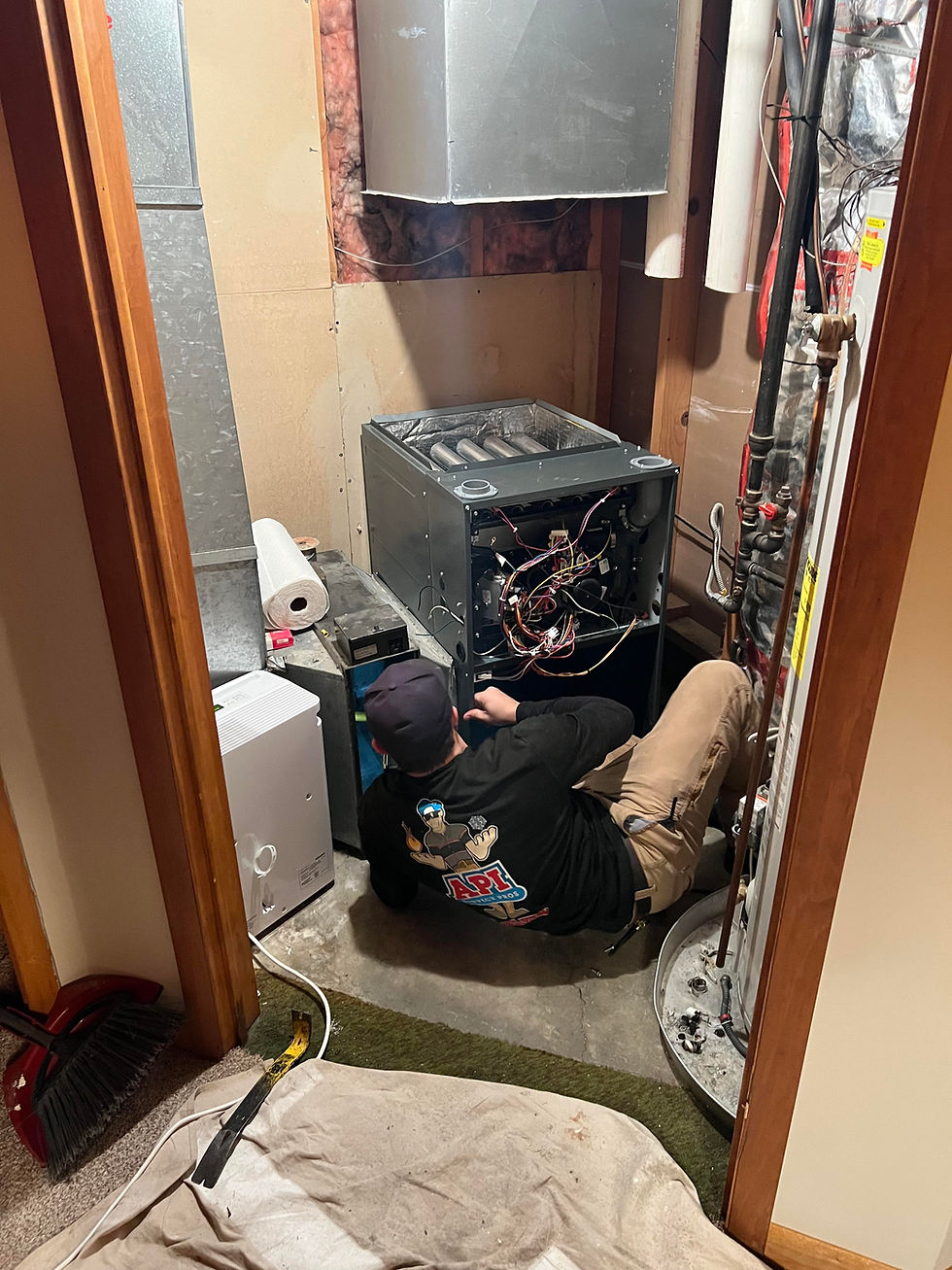How to Protect Your Family from Sickness This Season: Choosing The Right Air Purifier
- API Service Pros

- Nov 4, 2024
- 4 min read
Indoor air quality is a crucial part of maintaining a healthy home environment, especially during fall and winter when many of us spend more time indoors. With more people prone to seasonal allergies, colds, and even flu, air purifiers can be an invaluable tool in protecting your family’s health. But with various types of air purifiers available, it can be hard to know which is best suited for your home. In this guide, we’ll explore different types of air purifiers, their benefits, and how they work to keep sickness at bay.

Types of Air Purifiers
Air purifiers come in different styles, each with unique features and methods for cleaning the air:
1. HEPA (High-Efficiency Particulate Air) Filters
HEPA filters are known for their ability to capture tiny particles. They can trap up to 99.97% of pollutants as small as 0.3 microns, including dust, pollen, mold spores, and even some bacteria. These filters are ideal for people who suffer from allergies or asthma, as they remove particles that trigger symptoms.
2. Activated Carbon Filters
Activated carbon filters are designed to capture odors, smoke, and volatile organic compounds (VOCs) from household products and materials. While they may not trap particles as small as those captured by HEPA filters, they’re excellent for improving air quality by reducing odors and gases, making them a great complement to a HEPA filter system.
3. UV-C Light Purifiers
UV-C purifiers use ultraviolet light to kill bacteria, viruses, and other microorganisms that pass through the system. These purifiers are particularly effective in combating germs, making them a popular choice for households looking to reduce the spread of illness. However, they may be less effective for trapping allergens and dust, so pairing them with HEPA or carbon filters is often recommended.
4. Ionizers
Ionizers release negative ions, which attach to airborne particles, causing them to clump together and fall to the ground or onto surfaces. These purifiers can reduce airborne pollutants, though they don’t actually remove particles from the room. Some models also produce a small amount of ozone, which can be harmful in high concentrations, so it’s essential to research thoroughly if you’re considering an ionizer.
5. Whole-House Air Purifiers
Whole-house purifiers are typically installed within the HVAC system and work to clean the air as it flows through your heating and cooling system. These purifiers can use a combination of technologies, such as HEPA, UV, or activated carbon, and are beneficial for maintaining consistent air quality throughout the home. Whole-house air purifiers are a great choice for families with varying needs, as they can tackle allergens, germs, and odors effectively.

Health Benefits of Using Air Purifiers
Investing in an air purifier does more than reduce dust; it can protect your family from various health risks:
1. Reduces Allergies and Asthma Symptoms
HEPA filters can trap allergens like pollen, pet dander, and dust mites, reducing common triggers for allergy and asthma sufferers. Cleaner air can mean fewer symptoms, less discomfort, and fewer medications for some family members.
2. Limits the Spread of Airborne Germs
UV-C light purifiers and whole-house systems that include UV-C technology can effectively kill bacteria and viruses in the air, reducing the spread of colds, flu, and other infections. This is especially valuable for households with young children or elderly family members who may be more vulnerable to illness.
3. Removes Harmful Chemicals
Activated carbon filters can capture VOCs released by cleaning products, paint, and household materials, improving air quality and reducing potential respiratory irritation. This can be especially helpful for individuals with respiratory sensitivities or young children who are more affected by toxins.
4. Eliminates Odors
Air purifiers with activated carbon are also excellent for households with pets, smokers, or strong cooking odors. They work to neutralize unpleasant smells, creating a more inviting and comfortable home environment.
5. Improves Sleep Quality
Cleaner air can lead to better breathing, especially at night. By reducing allergens, pollutants, and potential irritants, air purifiers can help improve sleep quality for the whole family, reducing nighttime coughing, sneezing, or nasal congestion.
Why Consider a Whole-House Air Purifier?
While portable air purifiers are great for individual rooms, a whole-house purifier installed directly into your HVAC system offers comprehensive protection. Since it cleans the air as it circulates throughout the house, you get consistent air quality in every room. It’s also a quieter, more convenient option for many households, as it eliminates the need to move purifiers from room to room.
Whole-house systems are particularly beneficial if:
- You live in a home with pets, smokers, or someone with respiratory issues.
- You’re looking for more thorough protection against allergens and pathogens.
- You want to reduce the spread of seasonal illnesses.
Keeping Your Family Healthy with Cleaner Air
Adding an air purifier to your HVAC system is one of the most effective ways to create a healthy indoor environment for you and your family. By removing allergens, pollutants, and germs from the air, air purifiers not only help to keep sickness at bay but also improve your overall quality of life. Whether you opt for a portable purifier or a whole-house system, investing in cleaner air means investing in the health and well-being of your loved ones.





